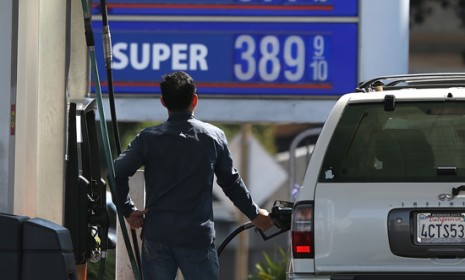Obama's 54-mile-per-gallon fuel standards: Extreme?
Environmentalists are hailing new auto rules as a key step in reducing greenhouse gas emissions — but Mitt Romney says the regulations go way too far

A free daily email with the biggest news stories of the day – and the best features from TheWeek.com
You are now subscribed
Your newsletter sign-up was successful
The Obama administration has finalized its new standards for cars and light trucks, mandating that automakers double the average fuel efficiency of their fleets to 54.5 miles per gallon by 2025. The ambitious rules — negotiated at length between the Environmental Protection Agency, 13 automakers, auto unions, and environmental groups — represent the most important step ever taken to reduce U.S. dependence on foreign oil, says President Obama. The White House predicts the new rules will cut greenhouse gas emissions of cars and light trucks in half by 2025, while saving consumers a ton in fuel costs. Obama's GOP rival Mitt Romney, however, says the "extreme" new standards will force consumers to buy pricier vehicles, such as hybrids, offsetting any gas savings. Are the rules over the top?
No. Everybody wins under the new standards: The new rules are "a boon to a key American industry, a godsend to American consumers, and a bold stroke against climate disruption," says Michael Brune at The Huffington Post. Car owners will save "$8,000 over the lifetime of a vehicle sold in 2025," while automakers can continue to capitalize on the growing popularity of fuel-efficient cars. And since the U.S. uses so much of its "oil for transportation, improving fuel efficiency is by far the most powerful tool we have for moving American beyond oil." This is a "high-water mark for the Obama administration" — truly "change we can believe in."
The Week
Escape your echo chamber. Get the facts behind the news, plus analysis from multiple perspectives.

Sign up for The Week's Free Newsletters
From our morning news briefing to a weekly Good News Newsletter, get the best of The Week delivered directly to your inbox.
From our morning news briefing to a weekly Good News Newsletter, get the best of The Week delivered directly to your inbox.
Yes. This will actually cost consumers dearly: "If you've been waiting around to buy a new car, better hurry up," says Daniel Greenfield at FrontPage. By 2025, the only model you'll be able to afford, if you're lucky, is a "small hybrid cube." These new rules could price "almost 7 million people out of the new car market." President Herbert Hoover once promised "a chicken in every pot and a car in every garage," but under Obama "I wouldn't count on being able to get the car."
"Why you will never buy a car again"
In the end, Americans will embrace these new rules: "Most Americans don't enjoy watching the meter run up as they fill their gas tanks," and a majority "say they prefer fuel-efficient cars and trucks," says Deborah Solomon at Bloomberg. Sure, new rules would increase the average price of a car by $1,800, but that's more than compensated for by the fuel savings. Romney's reaction highlights "the stark choice voters face this November about the path of U.S. energy policy." Obama has taken progressive, practical steps to reduce the country's dependence on foreign oil. Romney, on the other hand, has vowed to overturn the new standards, while rejuvenating the pollution-spewing coal industry, neither of which makes environmental or economic sense.
"Romney needs to make a u-turn on fuel standards"
A free daily email with the biggest news stories of the day – and the best features from TheWeek.com
-
 Crisis in Cuba: a ‘golden opportunity’ for Washington?
Crisis in Cuba: a ‘golden opportunity’ for Washington?Talking Point The Trump administration is applying the pressure, and with Latin America swinging to the right, Havana is becoming more ‘politically isolated’
-
 5 thoroughly redacted cartoons about Pam Bondi protecting predators
5 thoroughly redacted cartoons about Pam Bondi protecting predatorsCartoons Artists take on the real victim, types of protection, and more
-
 Palestine Action and the trouble with defining terrorism
Palestine Action and the trouble with defining terrorismIn the Spotlight The issues with proscribing the group ‘became apparent as soon as the police began putting it into practice’